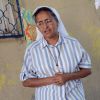Comboni nun works to help Eritreans tortured, raped en route to Israel
TEL AVIV, Israel (CNS) -- Comboni Sister Azezet Kidane is fluent in Amharic, Tigrit, Arabic and Sudanese dialects, so she was a natural choice when a shelter for African refugees needed help.
It was only after the nun, known as Sister Aziza, began conducting interviews with Eritrean refugees that she realized the people she was talking to had been tortured.
"It is a horror story what is happening," she told Catholic News Service from the African Refugee Development Center's shelter for single mothers and pregnant women in a low-income neighborhood of Tel Aviv.
Shahar Shoham, director of migrants and statusless people at Physicians for Human Rights Israel, said the first clue that something was happening in the Sinai Peninsula was the condition in which refugees arrived at their clinic in Tel Aviv.
"They told us of torture and rape and we saw the scars of their torture. People who were shot by the Egyptian forces at the border started coming to our clinic," said Shoham.
"Sister Aziza is a blessing for us. People feel comfortable opening up to her," she said. "The torture continues even now. As we are speaking it is happening."
In two-and-a-half years, Sister Aziza has taken testimony from some 1,500 refugees. As the Eritrean nun taps on the doors of the rooms, women greet her with hugs and kisses; a young girl runs after her to clutch her hand as they walk down the street together.
"I can't say all of the people I've interviewed have been kidnapped and tortured, but most of them have been," she said as she sat underneath the shade of tree in a dusty lot next to the women's shelter. "Sometimes (the victims) can't even (recount) what happened to them and when you know (what happened) you can't repeat it, it is shameful that a human being could do such a thing."
Many of the women who arrive at the shelter are pregnant from rape.
Eritreans leave their country to escape poverty and forced military service for the authoritarian regime.
In October, a delegation from the U.S. Catholic Conference of Bishops' Committee on Migration visited Egypt and reported that Eritrean refugees were being apprehended by Sudanese enforcement authorities while en route to Egypt. The authorities turn the refugees over to members of the Rashaida tribal clan, who sell them to Bedouin tribesman in Egypt's Sinai Peninsula.
A statement by Kevin Appleby, director of migration policy for the USCCB, said some 700 refugees were in captivity in the Sinai in mid-October. The refugees are subject to systematic rape and torture, he said.
Egyptian and Israeli authorities are aware of the kidnapping rings but still the practice continues, he said. He urged the U.S. government to work with Egypt to identify the "torture houses," rescue the refugees and consider them for "expedited resettlement." He also said the U.S. should also encourage Israel to "uphold its responsibility as a signatory of the 1951 refugee convention and halt the practice of denying entry to refugees and deporting them to dangerous situations."
Physicians for Human Rights Israel reports that some 7,000 of Eritrean refugees have been held for ransom and tortured and raped at the hands of their Bedouin kidnappers. Another 4,000 people have died en route to Israel, either as a result of being smuggled, tortured, or shot by the Egyptian soldiers following a shoot-to-kill policy, the agency said.
Israel is building a fence along its 150-mile southern border, cutting off the refugees' escape from the Sinai into Israel. In March, Israel began building a new detention center in the south of the country; initially, the center will hold 8,000 people.
At the Tel Aviv shelter, two Eritrean women -- one visibly pregnant -- sit at a metal tray set with coffee cups and grinder in front of the open door of their sparsely furnished room. A blue-and-green checked kitchen towel protects the last of their traditional round ambasha sweet bread from flies.
The women offer visiting journalists a slice of ambasha, but they decline to be interviewed or photographed.
The refugees are tired of journalists and being interviewed, Sister Aziza said. They see no concrete results from all the interviews they have given.
"How many journalists, how many videos have been done but the world is silent," said Sister Aziza, who was named a 2012 Trafficking in Persons Report Hero by the U.S. State Department for her work exposing the situation. "Nothing changes, nothing gets better for them. It is only getting worse. They are disappointed with all the efforts."
Through Caritas Italy funding the Comboni sisters have helped the women open a nursery for the young babies at the shelter so the mothers can work. In a separate basket-weaving workshop, women use their traditional skills to create colorful cloth baskets they sell.
Sister Aziza's phone number, which is passed around by word of mouth, is available 24 hours a day to refugees, human rights workers, diplomats and Israeli government agencies. The Israeli Prison Authority often contacts her for advice about underage refugees.
The work of listening to the refugees' stories is difficult, she said, and all she can do is be there for them to listen and then listen some more. Just a few days earlier she had gone on a 10-day retreat with a silent order near Jerusalem in order to gather her strength together to continue the work she said.
"Without prayer, I could not do this work," she said. "I want people of the world to break the silence, but only God will be able to change the hearts of the people."


